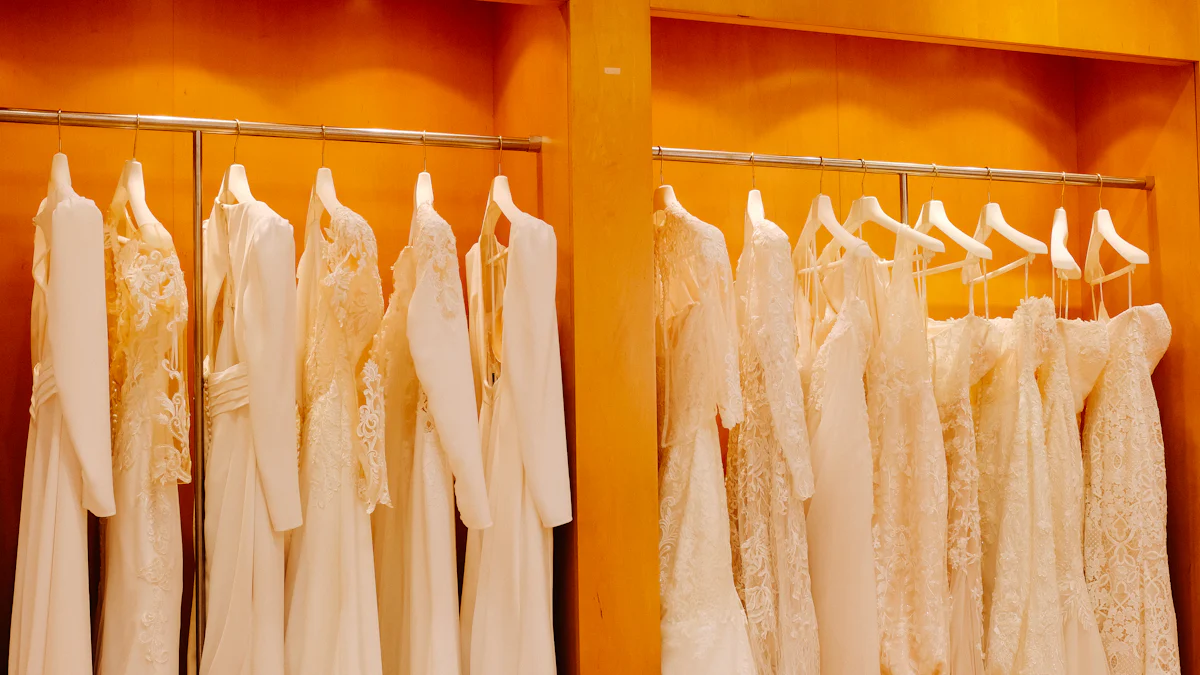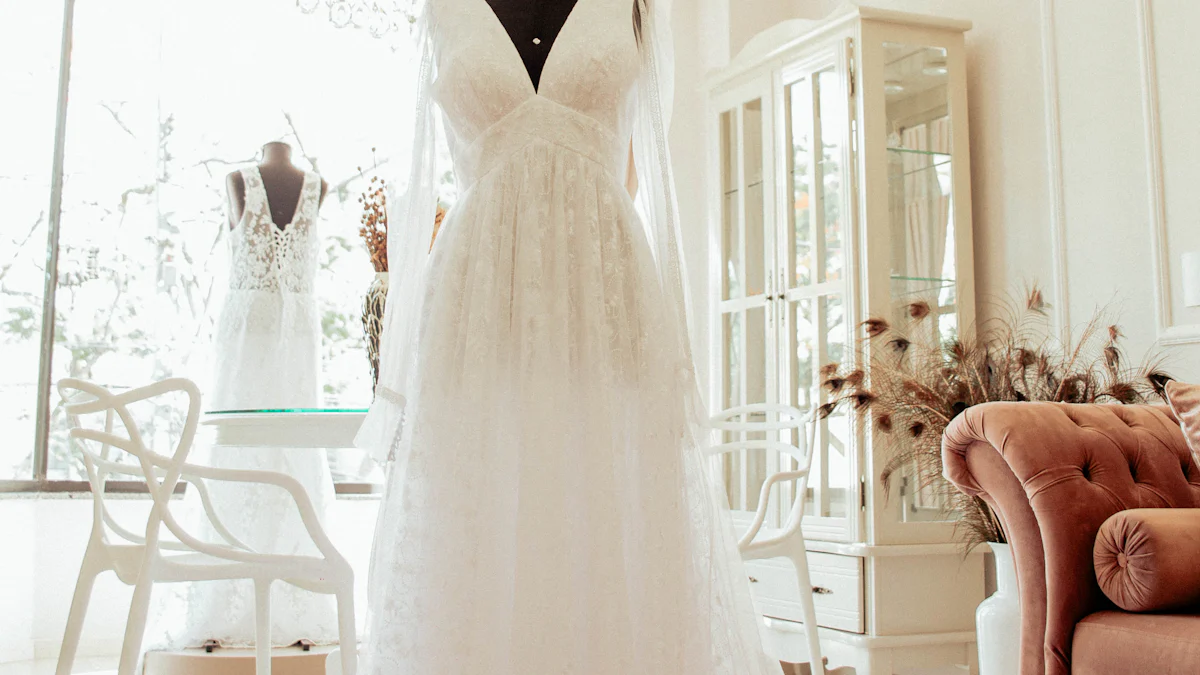How to Open a Wedding Dress Shop: Step-by-Step Guide

Opening a wedding dress shop requires meticulous planning and preparation. Understanding how to open a wedding dress shop involves researching market trends to grasp the demand and preferences of brides in the area. The bridal industry offers immense opportunities for those who understand its dynamics. Entrepreneurs can create memorable experiences for brides by offering unique and exclusive dress selections. Utilizing AI appointment scheduling can streamline the process, ensuring brides receive personalized attention. Additionally, integrating custom ChatGPT can enhance customer service by providing instant responses to inquiries. The average wedding cost in the United States reaches up to $33,204, highlighting the significant market potential. A well-planned bridal shop can cater to diverse customer preferences, ensuring every bride finds a dress that fits her style and body shape.
Conducting Market Research
Understanding Your Target Market
Identifying customer demographics
Identifying customer demographics forms a crucial step in opening a wedding dress shop. Entrepreneurs must understand the age, income level, and preferences of potential brides. This information helps tailor the inventory to meet specific needs. For instance, younger brides may prefer trendy and modern designs. Older brides might seek classic and elegant styles. Gathering this data ensures that the shop offers dresses that appeal to the target audience.
Analyzing competitors
Analyzing competitors provides valuable insights into the market landscape. Entrepreneurs should visit other bridal shops to observe their offerings and pricing strategies. Noting the types of dresses and services provided by competitors helps identify gaps in the market. This analysis aids in developing unique selling points for the new shop. Offering exclusive designer dresses or exceptional customer service can set the shop apart from others.
Assessing Market Demand
Researching local wedding trends
Researching local wedding trends helps gauge the demand for different types of wedding dresses. Trends can vary significantly between regions. Some areas may favor traditional gowns, while others may lean towards contemporary styles. Keeping abreast of these trends ensures that the shop stays relevant. Resources like The Wedding Report provide comprehensive data on wedding industry trends. Utilizing such resources helps in making informed decisions about inventory selection.
Evaluating potential customer base
Evaluating the potential customer base involves understanding the number of weddings in the area. High wedding rates indicate a robust market for wedding dresses. Entrepreneurs should also consider the spending habits of brides in the region. The average wedding cost in the United States reaches up to $33,204. Knowing this figure helps in setting appropriate price points for the dresses. A well-researched understanding of the customer base ensures that the shop meets the needs and expectations of brides.
Legal Requirements and Business Planning
Registering Your Business
Choosing a business structure
Selecting the right business structure is crucial for a wedding dress shop. Options include sole proprietorship, partnership, limited liability company (LLC), and corporation. Each structure has unique benefits and drawbacks. Sole proprietorships offer simplicity but lack liability protection. Partnerships share responsibilities but require clear agreements. LLCs provide liability protection and tax flexibility. Corporations offer extensive liability protection but involve complex regulations. Consult a legal advisor to choose the best structure for your bridal shop.
Obtaining necessary licenses and permits
Operating a bridal shop requires specific licenses and permits. Failure to comply can result in penalties or closure. Common requirements include a general business license, sales tax permit, and occupancy permit. Some states may require additional permits for retail operations. Check local regulations to ensure compliance. Visit the local government office or website for detailed information. Proper documentation ensures smooth business operations and avoids legal issues.
Creating a Business Plan
Defining your business goals
Clear business goals guide the direction of your bridal shop. Goals should be specific, measurable, achievable, relevant, and time-bound (SMART). Examples include increasing sales by 20% in the first year or expanding inventory to include designer dresses. Define short-term and long-term objectives. Short-term goals focus on immediate needs like securing suppliers. Long-term goals address growth and expansion. Clear goals provide a roadmap for success.
Financial planning and budgeting
Effective financial planning ensures the sustainability of your bridal shop. Start with an initial budget covering startup costs like rent, inventory, and marketing. Estimate ongoing expenses such as utilities, salaries, and maintenance. Project revenue based on market research and pricing strategies. Create a cash flow statement to track income and expenses. Regularly review and adjust the budget to reflect changes in the business environment. Proper financial management supports the growth and stability of your bridal shop.
Choosing a Location

Factors to Consider
Accessibility and visibility
Accessibility plays a crucial role in attracting customers. A location near popular landmarks or busy streets increases foot traffic. Brides often prefer shops that are easy to find. Ensure the shop has ample parking space. Public transportation options nearby also enhance accessibility. Visibility enhances brand recognition. A storefront with large windows and clear signage attracts attention. High visibility locations often lead to higher sales.
Space requirements
Space requirements depend on the size of the inventory and the services offered. A spacious shop allows for an inviting layout. Brides need room to browse and try on dresses comfortably. Consider separate areas for display, fitting rooms, and storage. Adequate space ensures a pleasant shopping experience. A cramped shop may deter potential customers. Plan the layout to maximize the use of available space.
Leasing vs. Buying
Pros and cons of leasing
Leasing offers flexibility. Short-term leases allow for easy relocation if needed. Lower upfront costs make leasing attractive for new businesses. Leasing agreements often include maintenance and repair services. This reduces operational burdens. However, leasing lacks long-term stability. Rent increases can impact profitability. Limited control over property modifications may restrict business growth.
Pros and cons of buying
Buying provides long-term stability. Property ownership eliminates rent increases. Owners have complete control over property modifications. This allows for customized layouts and expansions. Owning property can be a valuable investment. Property values may appreciate over time. However, buying requires significant upfront capital. Maintenance and repair responsibilities fall on the owner. Property taxes and insurance add to ongoing expenses.
Sourcing Suppliers and Inventory
Finding Reliable Suppliers
Researching potential suppliers
Researching potential suppliers forms a critical step in sourcing inventory. Entrepreneurs should seek suppliers with a strong reputation in the bridal industry. Premium Bridal Factory offers a reliable option. This platform, founded by industry experts with 40 years of specialized knowledge from Taiwan, revolutionizes the traditional bridal supply chain. Entrepreneurs can benefit from their commitment to sustainability and market equality.
Entrepreneurs should also explore various sources. Trade shows provide opportunities to meet multiple suppliers. Online directories offer a vast list of potential suppliers. Reading reviews and testimonials helps gauge supplier reliability. Entrepreneurs should prioritize suppliers with consistent quality and timely deliveries.
Building relationships with suppliers
Building strong relationships with suppliers ensures a steady inventory flow. Regular communication fosters trust and mutual understanding. Entrepreneurs should discuss expectations clearly. Negotiating favorable terms benefits both parties. Long-term partnerships often result in better pricing and exclusive deals.
Visiting suppliers' facilities provides insights into their operations. Observing production processes ensures quality standards. Entrepreneurs should express appreciation for good service. A positive relationship encourages suppliers to prioritize the bridal shop's needs.
Selecting Your Inventory
Choosing a variety of styles and sizes
Offering a diverse range of styles and sizes attracts a broader customer base. Savin London Wedding Dresses exemplify timeless couture with artistic effort. These dresses blend silks, laces, and hand-painted works, showcasing uniqueness and elegance. Entrepreneurs should include such high-quality options in their inventory.
Stocking various styles caters to different tastes. Some brides prefer classic designs. Others seek modern and trendy gowns. Including plus-size options ensures inclusivity. Entrepreneurs should consider seasonal trends. Popular styles may vary throughout the year.
Managing inventory levels
Effective inventory management prevents overstocking and stockouts. Entrepreneurs should track sales data to understand demand patterns. Regularly reviewing inventory levels helps maintain optimal stock. Implementing an inventory management system streamlines this process.
Entrepreneurs should reorder popular items promptly. Avoiding excess stock reduces storage costs. Offering discounts on slow-moving items clears space for new arrivals. Maintaining a balanced inventory ensures that brides find their perfect dress without delay.
Setting Up Your Shop

Designing the Store Layout
Creating an inviting atmosphere
Creating an inviting atmosphere ensures brides feel welcomed and comfortable. Use soft lighting to create a warm ambiance. Choose elegant furniture that complements the bridal theme. Comfortable seating areas allow brides and their families to relax. Display beautiful floral arrangements to add a touch of sophistication. Soft background music enhances the shopping experience.
Organizing the display area
Organizing the display area helps showcase the dresses effectively. Arrange dresses by style and size for easy browsing. Use mannequins to highlight featured gowns. Ensure fitting rooms are spacious and well-lit. Provide large mirrors for brides to view their dresses from all angles. Keep the display area clean and clutter-free.
Purchasing Equipment and Supplies
Essential equipment for a bridal shop
Essential equipment for a bridal shop includes high-quality mirrors and fitting room essentials. Invest in sturdy racks and hangers to display dresses. A steamer keeps gowns wrinkle-free. A cash register or point-of-sale system streamlines transactions. Comfortable seating for brides and their guests is crucial. Ensure the shop has reliable Wi-Fi for online appointment scheduling.
Additional supplies and decor
Additional supplies and decor enhance the shop's appeal. Elegant curtains and drapes add a luxurious touch. Beautifully framed photos of brides in their gowns create a personal connection. Offer refreshments like water and tea for a pleasant shopping experience. Stylish storage solutions keep accessories organized. Seasonal decorations keep the shop looking fresh and inviting.
Saida and Chantal, with almost two decades of fashion industry knowledge, emphasize the importance of offering a Paris-salon-style bridal dress shopping experience. Their approach includes a detailed selection of dress materials and creating a welcoming atmosphere for brides.
Setting up a wedding dress shop involves meticulous planning and attention to detail. An inviting atmosphere and well-organized display area ensure a memorable shopping experience for brides. Investing in essential equipment and additional decor enhances the shop's functionality and appeal.
Marketing and Promotion
Developing a Marketing Strategy
Identifying your unique selling points
Identifying unique selling points (USPs) distinguishes a wedding dress shop from competitors. Entrepreneurs should highlight exclusive designer collections. Emphasizing exceptional customer service can attract brides. Offering custom fittings and alterations adds value. Promoting eco-friendly or sustainable dresses appeals to environmentally conscious customers. Unique selling points create a compelling reason for brides to choose a specific shop.
Creating a marketing plan
Creating a marketing plan involves outlining strategies to reach potential customers. Entrepreneurs should set clear marketing objectives. Allocating a budget for marketing activities ensures effective resource use. Identifying target audiences helps tailor marketing messages. Entrepreneurs should choose appropriate marketing channels. Monitoring and evaluating marketing efforts ensures continuous improvement. A well-structured marketing plan drives business growth.
Utilizing Online and Offline Marketing
Building a website and social media presence
Building a website establishes an online presence. A professional website showcases the dress collection. Including high-quality images and detailed descriptions enhances appeal. An online booking system streamlines appointment scheduling. Social media platforms like Instagram and Facebook engage with potential brides. Regularly posting content keeps the audience interested. Collaborating with influencers expands reach. Online marketing attracts tech-savvy brides.
Traditional marketing methods
Traditional marketing methods remain effective. Entrepreneurs should consider print advertising in bridal magazines. Distributing flyers at wedding fairs reaches a targeted audience. Networking with wedding planners and venues creates referral opportunities. Hosting in-store events attracts local brides. Offering special promotions encourages visits. Traditional marketing complements online efforts. Combining both approaches maximizes visibility and customer engagement.
Hiring and Training Staff
Recruiting the Right Team
Job descriptions and requirements
Crafting clear job descriptions ensures the recruitment of suitable candidates. Define roles and responsibilities for each position. Specify qualifications and skills required. For example, a bridal consultant should possess excellent communication skills. Experience in retail or fashion enhances suitability. List physical requirements if necessary. Include the ability to lift heavy dresses or stand for long periods. Clear job descriptions attract qualified candidates.
Interviewing and hiring process
The interviewing process identifies the best candidates. Prepare a list of questions that assess relevant skills. Focus on customer service experience and problem-solving abilities. Conduct multiple interview rounds to evaluate different aspects. Use role-playing scenarios to gauge responses to common situations. Check references to verify past performance. Offer positions to candidates who demonstrate strong potential.
Staff Training and Development
Training on customer service
Effective customer service training enhances the shopping experience. Teach staff to greet customers warmly. Emphasize active listening to understand customer needs. Train staff to offer personalized dress recommendations. Role-playing exercises improve handling of difficult situations. Encourage staff to maintain a positive attitude. Regularly review customer service techniques to ensure consistency.
Ongoing staff development
Ongoing development keeps staff skills sharp. Schedule regular training sessions on new trends and products. Encourage staff to attend industry workshops and seminars. Provide opportunities for career advancement within the shop. Offer incentives for outstanding performance. Monitor staff progress and provide constructive feedback. Continuous development fosters a motivated and skilled team.
Survey Results: Around 70% of respondents in each industry answered that they "make use of the content of employee training in their work or make use of it a little," indicating that employee training has a certain effect on their work.
Investing in staff training and development ensures a high level of service. A well-trained team contributes to the success of the wedding dress shop.
Managing Operations and Growth
Day-to-Day Operations
Inventory Management
Effective inventory management ensures the smooth operation of a wedding dress shop. Entrepreneurs must use inventory management software to track stock levels accurately. This software provides real-time data on available dresses, preventing overstocking or stockouts. Regularly reviewing sales data helps identify popular styles and sizes. Reordering these items promptly maintains a balanced inventory.
Implementing an organized system for storing dresses enhances efficiency. Categorizing dresses by style and size simplifies the browsing process for brides. Proper labeling and tagging of each dress ensure easy identification. Regular audits of inventory help detect discrepancies early. Maintaining optimal inventory levels reduces storage costs and improves cash flow.
Customer Service Best Practices
Exceptional customer service sets a wedding dress shop apart from competitors. Staff should greet brides warmly upon arrival. Active listening helps understand each bride's preferences and needs. Offering personalized dress recommendations enhances the shopping experience. Staff should remain patient and supportive throughout the fitting process.
Ensuring that fitting rooms are clean and comfortable creates a positive impression. Providing refreshments like water and tea adds a thoughtful touch. Follow-up communication after appointments shows genuine care for customers. Encouraging brides to share their experiences online builds a positive reputation. Consistently delivering excellent customer service fosters loyalty and word-of-mouth referrals.
Strategies for Growth
Expanding Your Product Line
Expanding the product line attracts a broader customer base. Introducing new styles and designers keeps the inventory fresh and appealing. Offering accessories like veils, shoes, and jewelry complements the dress selection. Including bridesmaid dresses and mother-of-the-bride outfits caters to the entire bridal party.
Collaborating with local designers for exclusive collections creates unique selling points. Hosting trunk shows and special events showcases new arrivals. Promoting these events through social media and email marketing generates excitement. Expanding the product line increases sales opportunities and enhances the shop's appeal.
Opening Additional Locations
Opening additional locations allows for business growth and market expansion. Conducting thorough market research identifies potential areas with high demand. Choosing locations with good accessibility and visibility attracts more customers. Ensuring that each new shop maintains the same high standards of service and inventory is crucial.
Hiring and training staff for new locations ensures consistent customer experiences. Implementing a centralized inventory management system streamlines operations across multiple shops. Promoting new locations through targeted marketing campaigns raises awareness. Opening additional locations increases brand presence and revenue potential.
Implementing AI Appointment Scheduling
Benefits of AI Appointment Scheduling
Streamlining the booking process
AI appointment scheduling revolutionizes the booking process for wedding dress shops. Traditional methods often involve manual entries and phone calls, leading to errors and inefficiencies. AI appointment scheduling automates these tasks, ensuring accuracy and saving time. Brides can book appointments online at their convenience, reducing the need for back-and-forth communication. This automation minimizes human error, ensuring that bookings are correctly recorded and managed.
AI systems can handle multiple bookings simultaneously, preventing double-booking and scheduling conflicts. The system sends automatic reminders to brides, reducing no-shows and cancellations. This streamlined process allows staff to focus on providing exceptional customer service rather than managing schedules manually. Implementing AI appointment scheduling enhances operational efficiency and ensures a smooth booking experience for brides.
Enhancing customer experience
Enhancing the customer experience is crucial in the bridal industry. AI appointment scheduling plays a significant role in achieving this goal. Brides appreciate the convenience of booking appointments online without waiting for business hours. The system provides real-time availability, allowing brides to choose the most suitable time slots. This flexibility caters to brides with busy schedules, ensuring they receive personalized attention.
AI systems can also gather valuable data about customer preferences and behaviors. This information helps staff prepare for appointments, offering tailored recommendations based on previous interactions. Personalized service creates a memorable shopping experience, increasing customer satisfaction and loyalty. AI appointment scheduling not only simplifies the booking process but also elevates the overall customer experience.
Using Newoaks AI for Appointment Booking
Setting up Newoaks AI
Setting up Newoaks AI for appointment booking involves a straightforward process. Entrepreneurs must first create an account on the Newoaks platform. The system guides users through the initial setup, including configuring business details and operating hours. Newoaks AI integrates seamlessly with existing systems, ensuring a smooth transition.
Once the basic setup is complete, entrepreneurs can customize the booking interface to match the shop's branding. Adding a booking widget to the shop's website allows brides to schedule appointments directly online. The system provides detailed instructions for embedding the widget, ensuring a user-friendly experience. Setting up Newoaks AI requires minimal technical expertise, making it accessible for all bridal shop owners.
Customizing appointment settings
Customizing appointment settings in Newoaks AI ensures that the system meets the specific needs of the bridal shop. Entrepreneurs can define appointment types, such as initial consultations, fittings, and alterations. Each appointment type can have different durations and staff assignments. This customization ensures that the system accurately reflects the shop's services.
The system allows for setting buffer times between appointments, ensuring staff have adequate time to prepare for the next bride. Entrepreneurs can also configure automatic reminders and follow-up messages to enhance customer communication. Customizing appointment settings in Newoaks AI ensures a tailored and efficient booking process, meeting the unique requirements of the bridal shop.
Leveraging Custom ChatGPT for Customer Interaction
Advantages of Custom ChatGPT
Providing Instant Customer Support
Custom ChatGPT revolutionizes customer support in wedding dress shops. ChatGPT provides instant responses to customer inquiries. This feature eliminates the need for human agents in initial interactions. Customers receive immediate assistance, enhancing their shopping experience. ChatGPT handles multiple queries simultaneously, ensuring no customer waits for help. The system's efficiency reduces response times and increases customer satisfaction.
Personalizing Customer Interactions
Custom ChatGPT personalizes interactions by learning from previous conversations. The system remembers customer preferences and provides tailored recommendations. Brides feel valued when receiving personalized suggestions. ChatGPT can suggest dresses based on style, size, and budget. This personalized approach builds a strong connection with customers. Brides appreciate the attention to detail and are more likely to make a purchase.
Integrating Custom ChatGPT into Your Shop
Setting Up the Chatbot
Setting up Custom ChatGPT involves a few simple steps. First, create an account on the ChatGPT platform. Follow the setup guide to configure business details. Customize the chatbot interface to match the shop's branding. Add the chatbot widget to the shop's website. This integration allows customers to interact with ChatGPT directly online. The setup process requires minimal technical expertise, making it accessible for all bridal shop owners.
Training the Chatbot for Specific Queries
Training Custom ChatGPT ensures it handles specific queries effectively. Input common questions and answers related to wedding dresses. Include information about styles, sizes, and pricing. Train the chatbot to handle appointment bookings and fitting schedules. Regularly update the chatbot with new information and trends. Continuous training improves the chatbot's accuracy and relevance. A well-trained ChatGPT enhances the overall customer experience.
Opening a wedding dress shop involves several key steps. Conduct thorough market research to understand customer demographics and competitors. Secure necessary licenses and permits for legal compliance. Choose a strategic location with high accessibility and visibility. Source reliable suppliers and maintain diverse inventory levels. Design an inviting store layout and invest in essential equipment. Develop a robust marketing strategy and utilize both online and offline methods. Hire and train a dedicated team to provide exceptional customer service. Implement AI appointment scheduling and Custom ChatGPT to enhance operations.
Entrepreneurs should remain committed to their vision. Saida and Chantal emphasize the importance of creating a memorable shopping experience. Brides appreciate a welcoming atmosphere and personalized service. Bringing shapewear, nude underwear, heels, dress pictures, and supportive companions enhances appointments.
Aspiring bridal shop owners should take action now. Start planning and executing each step meticulously. The journey may be challenging, but the rewards are immense. Create a bridal shop that stands out and makes every bride's dream come true.
See Also
2024: A Complete Manual on Shopify Bots Evolution
Optimize Sales Pipeline Using Stepwise AI Chatbot Assistance
Revamp Shopify Outlet with Real-Time AI Chat Support
Decade's Top Tactics for Expanding Service Enterprise via ChatGPT

